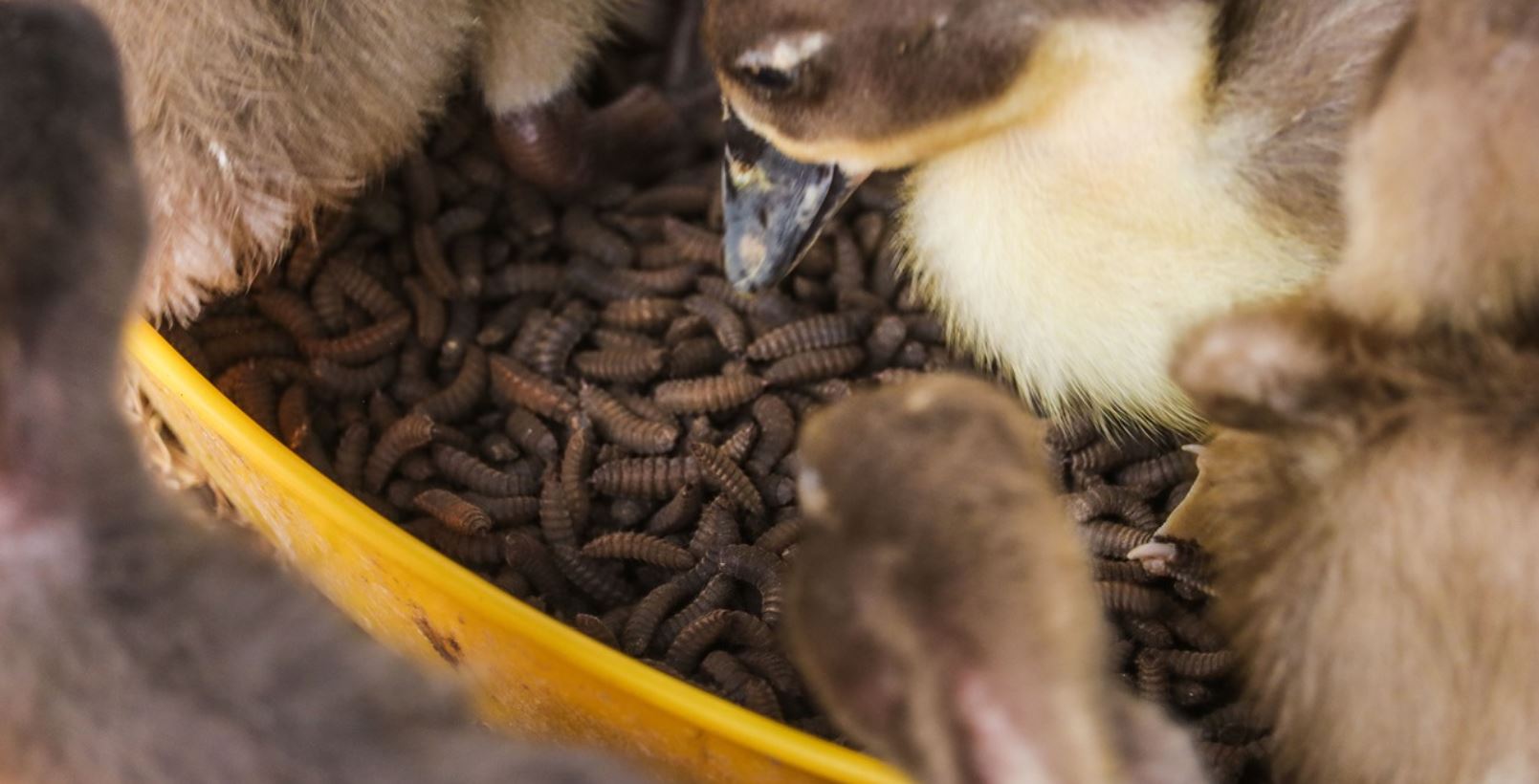We are experimenting with black soldier fly (BSF) larvae as an effective duck feed alternative.
THE PROBLEM
Duck breeders in Klungkung and Tabanan, Bali, face difficulties finding alternative sources of feed for their ducks. Their current duck feed consists of a mix made up of three parts bran with one part concentrate and is viewed as problematic for two primary reasons:
- Large-scale duck breeders in Bali cannot produce their own bran and concentrate. Instead, they must purchase this feed from non-Bali based suppliers, leaving the breeders vulnerable to inconsistent sourcing, excessive shipping fees, and price fluctuations when there is a supply disruption.
- The bran and concentrate is expensive impacting their duck farming profit. The concentrate costs approximately IDR 385,000 (~US$28.89) per 50 kg sack (or about IDR 7,600 or ~US$0.57 per kg), while bran costs IDR4,000 (~US$0.3) per kg. On average, each duck breeder in Klungkung has 3,000 ducks bred for their meat and eggs. This amount of ducks require 100 kg of concentrate and 300 kg of bran per day, which totals nearly IDR 2,000,000.00 (~US$150) in daily feeding costs.
To address these challenges, there is a need to improve the supply of duck feed in Bali by introducing a more sustainable, locally produced, and inexpensive product.
THE SOLUTION
BSF larvae are a harmless species of insect that is common to tropical and warmer temperate regions. Rearing BSF is an efficient way to dispose of organic waste as the BSF larvae who feed on the organic waste are converted into a protein and fat-rich biomass suitable as a feed supplement.
We want to test whether BSF larvae is an effective duck feed alternative by comparing three types of duck feed:
- A mix of concentrate and bran (Control-A);
- A mix of vegetable waste and bran (Control-B);
- A Mix of a normal amount of BSF larvae and bran (Treatment-A);
- A mix of double BSF larvae and bran (Treatment-B)
- the weight of each duck;
- the costs for each of the three varieties of feed; and
- the selling price for each duck once they reach maturity.
Black Soldier Fly (BSF) is a harmless type of insect that feeds organic waste
The larvae of BSF have high protein content and could be suitable as animal feed
We are conducting an experiment to feed the ducks by BSF larvae as a more sustainable source of animal feed
THE EXPECTED IMPACT
We hope the result of the test indicates that BSF is a viable alternative source of duck feed. If the BSF larvae prove nutritionally comparable to the current feed, duck breeders in Bali can save money by purchasing feed that is produced locally and is not as prone to price fluctuation.
THE PROJECT RESULT
This experiment proves that BSF larvae are a healthy and nutritionally comparable alternative protein to the current duck feed used in Bali. The results of the laboratory test showed that our BSF larvae have 61 percent protein content, 27 percent fat, and 31 percent crude fiber. Meanwhile, the typical concentrate used by duck owners in Bali contains only 37-39 percent protein, 2-3.5 percent fat and 6 percent crude fibre.
In terms of the weight, the group fed with double the amount of BSF larvae (Treatment B) were the heaviest amongst all groups with an average weight of 1.57 kg. This was followed by Control A, fed by concentrate (1.45 kg), and Treatment A, fed by one portion of BSF (1.19 kg). Control B fed by vegetable waste only were on average, 0.93 kg but needed to be supplemented by BSF after day 10. Despite these differences in weight, there was actually no difference in price for the ducks sold from groups 1, 2, and 3. This was because the buyer was a middleman who was selling the ducks as offerings for Balinese ceremonies and therefore the weight of the duck did not matter. If they were sold to a restaurant however, we assume the weight difference would influence the price.
Acknowledging the initial investment needed to build the BSF breeding facility, ongoing labor costs and the transport cost to obtain food waste to feed the BSF, we found that a duck farmer needs at least 140 ducks to make the cost of feeding their ducks with BSF and bran equal to the cost of feeding them with concentrate and bran for 40 days. This means that for a small subsistence duck farmer who has less than 140 ducks, rearing BSF for their duck feed, may not be immediately economical unless they can minimize the cost of labor and transportation by building and tending the BSF breeding facility themselves and having sufficient waste in their houses to feed the larvae.
PROJECT COST
Project Implementation and Technology
Costs associated with project coordination and the technology
$2,542
Monitoring and Evaluation
Costs associated with data collection and analysis
$795
Administration Fee
Cost of transferring payments internationally, processing online donations (5%) and a contribution to Kopernik's operational costs (15%)
$692
Total $4,029
Kopernik Solutions provided a sub-grant to a trusted partner organisation who is implementing this project.




